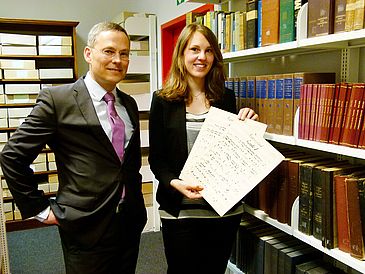While delving into the archives of the Bremen Philharmonic Society, musicologists of the University of Bremen came across a collection of long-believed lost sheets of music written by Johannes Brahms for the premiere of the Triumphliedop. 55. As patron of culture, the Bremen Philharmonic Society has exercised a considerable influence on the development and variety that has shaped the musical scene in Bremen over the past 200 years. On the basis of the historical notes for choir and orchestra parts and by drawing comparisons with later scores of this major work, Professor Ulrich Tadday and Katrin Bock have managed to completely reconstruct the musical score written for the premiere in 1871.
The end result of long months of research even surpassed the scholars’ own expectations. The composition differs from the previously known versions to such an extent that it is deemed by experts to constitute a separate work in its own right and the version is being referred to as the “Bremen Triumphlied”. The re-discovered opus is subsequently now included in the complete edition of Johannes Brahms’ works, published as a study edition by Henle-Verlag.
Researchers have identified in excess of 300 deviations and numerous major as well as minor amendments to the composition in contrast to later versions, and the Bremer Triumphlied is in D-major, not C-major. It includes fewer wind instruments, and the large chorus parts are far more fluid in their rhythm and articulation. All in all, the re-discovered musical score is far more delicate, less dramatic and martial in its composition.
Brahms was inspired to write the composition for double choir and large orchestra by his friend, the Bremen musical director Karl Martin Reinthaler. At the time, Brahms wrote to Reithaler, describing the piece as his “political observations of the year” the German Empire was created. News of victory in the Franco-Prussian war had reached Brahms in Vienna just a few days before the choir notes were sent to Bremen. The two planned the Good Friday premiere concert in honor of the war dead, and it was Brahms himself who conducted the orchestral musicians and 200 choir singers in the Bremer Dom on 7th April 1871.
Nowadays the Triumphlied is seldom performed – precisely due to its politico-historical associations. The new performance of the Bremen version of the 1871 Triumphlied will show whether and to what extent the degree of nationalist sentiment so inherent to hitherto versions of the opus may possibly be surpassed.
You can obtain more information by contacting:
Universität Bremen
Fachbereich Kulturwissenschaften
Institut für Musikwissenschaft und Musikpädagogik
Prof.Dr. Ulrich Tadday
Phone: +49 421 218 67760
email: taddayprotect me ?!uni-bremenprotect me ?!.de
Katrin Bock
Phone: +49 421 218 67762
email: kbockprotect me ?!uni-bremenprotect me ?!.de
www.brahms.uni-bremen.de

